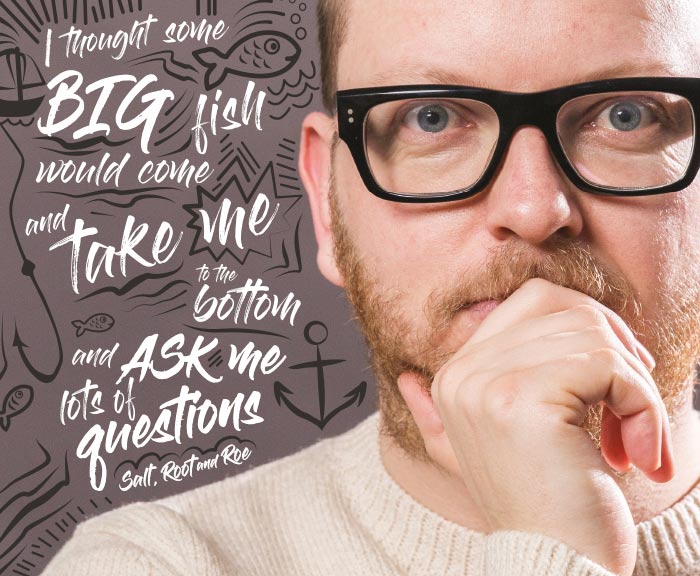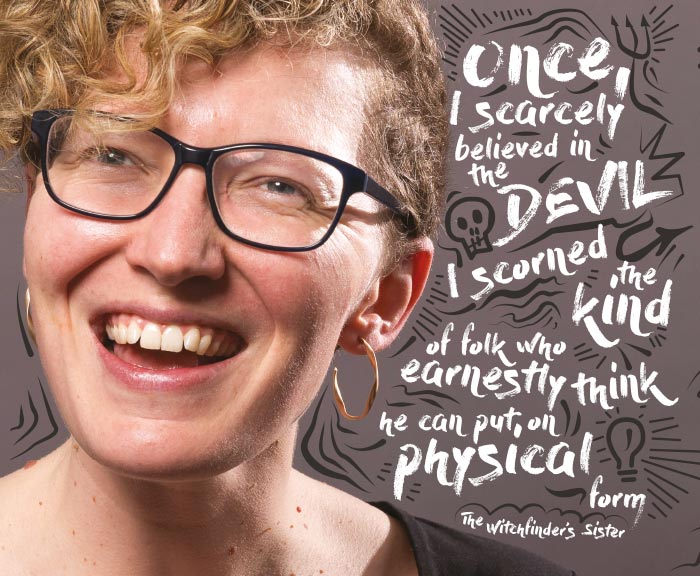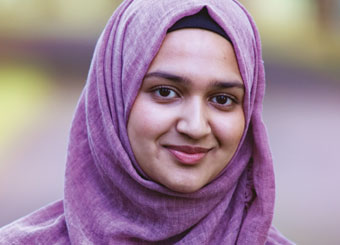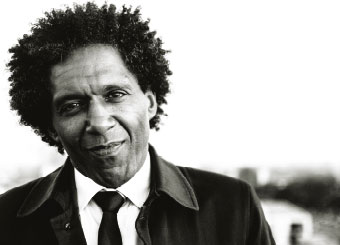Manchester goes into 2018 buoyed by international recognition as a UNESCO City of Literature – a destination dedicated to pursuing excellence in the written word, sharing stories and engaging citizens in books, both locally and around the globe.
From the gothic history of its John Rylands Research Institute and Library, to the rich seam of best-selling authors and playwrights who have graduated from here, The University of Manchester has an ongoing role in a truly great literary city. We look at our past, present and future, as well as remembering those greats who have studied and taught at the University, helping to secure our place on the global map.

Hallie Fletcher, student
Final-year English Literature student Hallie Fletcher grew up in the east of the city and had her first work published aged 16, despite having fallen pregnant a year earlier. Her early publication gave her the determination to succeed both in her writing and as a single mum and, at 19, she took an access course and received a conditional offer to study at the University’s Faculty of Humanities.
Hallie went on to receive a scholarship for study via the University’s donor-funded Manchester Access Programme (MAP) and is due to graduate this summer. “My first published poem, Apple of My Life, inspired by the life and death of World War II codebreaker Alan Turing, was put in the Portico Library Anthology when I was 16 years old,” she recounts. “I became interested in Turing when my grandad told me about him after I questioned the name of Alan Turing Way, a road in Manchester near our home.
“I grew up in Harpurhey, next to the street where the famous writer Anthony Burgess once lived.
Even the deprived areas here have history.”
Hallie adds: “When I think of Manchester and its contribution to literature, the first thing that comes to my mind is the great people I have studied and their roles in Manchester: Friedrich Engels, Elizabeth Gaskell, Karl Marx. The second thing is how amazing the University is to study literature at. I thank the MAP scheme for giving me the opportunity to study here.
“The tutors are incredible and the University is very supportive. I look back at old essays and can’t believe how far I’ve come with my writing. That’s thanks to the University and its help. I’ve been extremely lucky to receive a bursary and a donor-funded scholarship, which have allowed me to self-publish two books, Love, Sex and Death and Moth. Without this support, I wouldn’t have had the opportunity to do so.”
Read more about Hallie’s story

Tim Price, lecturer
Screenwriter and playwright Tim Price joined our staff at the Centre for New Writing in 2015 and teaches on the University’s Screenwriting MA. His television credits include Eastenders, Holby City and Casualty. His plays, meanwhile, have been billed at the Royal Court and National Theatre and have earned him Olivier and BAFTA Cymru award nominations.
“The University is a world-leading centre for excellence in research and that carries through to the practice of creative writing staff,” Tim says. “To be able to share time and ideas with writers like Jeanette Winterson, Vona Groarke, John McAuliffe, Beth Underdown, Kaye Mitchell, Frances Leviston, Kamila Shamsie, Ian McGuire and Honor Gavin is a huge attraction. As a working writer it’s very easy to become ghettoised in your own creative community, so to spend time with people who excel in their chosen field offers intellectual and creative stimulation that you cannot find easily.
“I feel like there are millions of departments in the University that, as a screenwriter and dramatist, I just want to walk around with my notebook and knock on the doors of some professors and go: ‘Hello! What do you do?’”
The city itself is also a source of inspiration for Tim’s work. “I think of both historical and contemporary playwrights and great TV writers who are, if not from Manchester, based here,” he explains. “And the close working relationship that the University’s drama department has with Manchester’s Royal Exchange Theatre means students have a good understanding of where playwriting sits at the heart of the city.
“I’m currently working on a four-part TV series set in Manchester that we’ll be taking to Channel 4, and I’m working on a sci-fi series that I hope to set around Jodrell Bank, so the city has become very present in my creative practice. It’s not a conscious thing but the more time you spend here, the more it gets under your skin.”

In Manchester there’s a constant stream of amazing literature events, including a really vibrant live lit and spoken word scene.
Beth Underdown, alumna and lecturer
Beth Underdown graduated from the University’s Centre for New Writing with an MA in Creative Writing in 2013, later joining the Centre as a lecturer in 2016. Her debut novel, The Witchfinder’s Sister, based on the witch-hunts orchestrated by Matthew Hopkins in 17th-century Essex, was published in 2017.
“Studying part-time on the Creative Writing MA was the best decision I ever made as a writer. I came to the course knowing when fiction felt ‘right’, but without any of the concepts or words to describe why fiction works in the ways it does,” Beth says.
“MA students publish an anthology of their work every year, and it was through this that I was approached by my agent who then placed my book with Penguin. As an alumna, I was supported through this process by some of the writers alongside whom I now have the honour of teaching – and I’m now supporting our students and alumni in turn.
“More than anything, the course is a community of writers – I’m still in touch with a lot of the writers I met in my first year.”
As a Mancunian, Beth has always had a huge love for the city and feels like exciting things are happening.
“There’s a constant stream of amazing literature events, including a really vibrant live lit and spoken word scene,” she says. “The Centre for New Writing has just become an official partner of the Manchester Literary Festival and was also involved in the successful UNESCO bid.
“Manchester and its surrounds are a lot more affordable to live in than other cities with comparable literary communities. Since moving here, I’ve found it much easier to find the time and space to write than I have anywhere else.”
Alys Conran, alumna
Alys Conran’s first novel Pigeon – a tale of childhood friendship torn apart – was published in 2016 and won the Wales Book of the Year 2017. Alys, 37, graduated from the University’s Centre for New Writing with an MA in Creative Writing in 2012. She now lives in Bethesda, near Bangor, and lectures in Creative Writing at the University of Bangor while working on her second novel.
She says: “The University of Manchester has been the home of so many writers with huge reputations, including Jeanette Winterson, Colm Toibin, Martin Amis, Ian McGuire, MJ Hyland and Geoff Ryman. The role that a department like that can have in a city’s literary community, and for a city’s potential to stimulate great literary work, can't be overestimated.
“The course gave me a tremendously valuable experience of what it means to have my work be public even before I experienced publication proper. The positive reception that early drafts of Pigeon got from tutors and fellow students was so galvanising. It was especially valuable to see that the book could be loved by readers of different backgrounds and that its cultural backdrop wasn't a barrier but a strength. Without the affirmation from the course at Manchester, I might have given up. Pigeon might never have gone on to be published, to be enjoyed by readers, nor to win awards.
“The city of Manchester is responsible for some vital and original narratives of urban life. Writers like Anthony Burgess or Howard Jacobson are absolute masters of writing urbanity in all its complexity and nuance. I've always felt that Manchester contributes a fresh alternative to London's literary scene. Manchester can somehow absorb and include writing from all over the world, including Scottish, Welsh and Irish writing, in a way that London seems to struggle to. I think it's both an inclusive and a very discerning literary community.”
The winning UNESCO bid
Manchester’s status as a City of Literature was announced in November 2017. Its successful bid to UNESCO places it alongside Baghdad, Dublin, Barcelona, Prague, Melbourne, and Reykjavik in a global network of Creative Cities renowned for their literary contribution to the world, incorporating fiction and non-fiction, poetry and prose.
The bid was directed by a committee of 15 people, including John McAuliffe, Kaye Mitchell and Jerome de Groot from the University’s Centre for New Writing, which this year celebrates its tenth anniversary. It was coordinated by a consortium involving The University of Manchester, Manchester Metropolitan University, Manchester City Council and the Manchester Literature Festival, plus representatives of the city’s writers, publishers and literary organisations.
John McAuliffe, Reader in Modern Literature and Co-director of the Centre for New Writing, explains: “It was really important that working writers and academics were involved to make the case for both writers and writer development. The vitality of the literary community depends on writers creating new work; for us that involves getting our students and staff involved in the business of writing.
“We already do so much. We had to prove to UNESCO that there was an unusual, existing amount of activity in this art form and that we have workable plans to develop that in the future. This new status gives us, the Manchester community, fresh momentum to do new things.”
City of Literature events
A host of events are planned to celebrate Manchester’s new standing as a global City of Literature during 2018, both across the city and the University campus. In honour of its UNESCO status, organisers are putting together a programme that will look to bring writing and reading to life for new and existing lovers of literature, young and old.
The Faculty of Humanities and Centre for New Writing’s Literature Live reading series will feature heavily in the year’s celebrations, bringing contemporary writers from all over the world to Manchester to discuss and read from their work. Many of these have been co-programmed with the annual Manchester Literature Festival, for which the Centre been appointed as official Higher Education Partner.
Browse our Centre for New Writing events
Literary greats
Louis de Bernières
Best-known for his wartime tale of love, Captain Corelli’s Mandolin, fiction-writer and poet Louis de Bernières graduated in Philosophy from the University and explored several career paths before becoming a published – and later award-winning – author in 1990, with his first novel The War of Don Emmanuel’s Nether Parts. He is a regular feature on must-read lists.
Alex Garland
Novelist and screenwriter Alex Garland studied Art History at the University. Inspired by his travels as a backpacker, his first, award-winning novel The Beach was published in 1996 and was translated to the big screen. He has since penned the screenplays for 28 Days Later and Sunshine, both directed by Manchester’s Danny Boyle.
WG Sebald
Winfried Georg Maximilian Sebald was born in wartime Germany in 1944. Having studied in Switzerland, he came to Manchester and joined the University as a language assistant in 1966. Sebald’s reflections on the Holocaust, combining memoir, travelogue and history, secured his place among the 20th century’s great writers.
Robert Bolt
Cheshire-born playwright Robert Bolt graduated from the University before entering the RAF and embarking on a hugely successful writing career. The recipient of two Academy Awards, he is best known for writing the screenplays for Lawrence of Arabia, Dr Zhivago and the silver screen adaptation of his own original play, A Man for All Seasons.
Jeanette Winterson
Born in Manchester, Jeanette Winterson’s first book, Oranges Are Not the Only Fruit, was published in 1985, when she was 24. She has since written more than a dozen books, including her memoir Why Be Happy When You Could Be Normal? In 2006, Winterson was awarded an OBE for services to literature. She was appointed Professor of Creative Writing at Manchester in 2012.
Alison Uttley
The creator of charming children’s series, Little Grey Rabbit, Little Red Fox and Sam Pig, Alison Uttley, born in 1884, wrote over 100 books in her lifetime, having initially studied Physics on a scholarship. She became the University’s second female Honours graduate and was awarded an honorary Doctor of Letters in 1970.
Learn more on the City of Literature and our Centre for New Writing websites.





